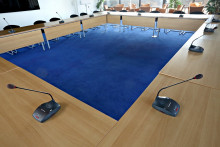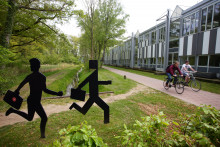Provided the Senate agrees to education minister Dijkgraaf's recently passed bill, numerus fixus programmes can (re)use lottery. Since this academic year, UT has three bachelor's programmes that apply such a numerus fixus - a maximum intake of first-year students: Technical Computer Science and Psychology introduced the fixus last September. The programme of Technical Medicine has long had a numerus fixus.
Possibility, no obligation
At Technical Medicine, they have not yet decided what to do with their selection procedure, programme director Jasper Homminga informs. 'Nonetheless, we are happy that it looks like drawing lots will be included in the legislation again. It is also very likely that we will include this instrument in our selection procedure. Assuming that the Senate approves the bill, we want to decide in the coming months what to do with our selection procedure.'
In Technical Computer Science, the chances are smaller that drawing lots will be used, says programme director Vadim Zaytsev. 'What I understand from the bill is that we may use lottery in our selection procedure in full or in part; it is a possibility, but not an obligation,' he says. 'It will probably solve some problems, but not the problems we currently have.'
After all, the programme had to institute a numerus fixus because of 'unbridled growth' in recent years. 'With the numerus fixus, we can exercise control over our intake. To put it bluntly: we can handle an intake of 400 students just fine - though not without challenges. For large lectures, for instance, we divert to Kinepolis cinema. But there is no way we can handle 800 students,' says Zaytsev.
'Even more uncertainty'
His programme selects students using a survey and an entrance exam, which includes an 'Algorithmic Thinking Test' as part of it. Most important is finding the right 'profile', says Zaytsev. 'For that, we don't have a strict definition. But we put an enormous amount of energy into the personal approach during our selection process; we organise contact moments - both physical and digital, discuss someone's concerns and give personal feedback. We want them to make the right study choice.'
It is precisely this personalised approach that makes Zaytsev sceptical of lottery. 'It depersonalises selection and brings even more uncertainty into the lives of already stressed-out young people. Drawing lots might help control intake, but it could potentially damage finding students with the right profile. How many of these randomly selected students end up failing to get their bsa, effectively wasting a year of their lives - as well as university resources?'
Flaws
Technical Medicine currently selects students based on the average 5vwo grade. This is combined with a homework assignment that prospective students have to complete. 'By doing this, we hope to get a picture of everyone's intellectual skills, cognitive analytical skills, basic knowledge, study skills, motivation, vision of future profession and knowledge of the programme,' Homminga says.
But selecting at the gate also brings challenges, Homminga knows. 'Ideally, of course, you select the best technical physicians. But that means that you have to predict the qualities of a 24-year-old graduate on aspects of the 17-year-old version of that same person... It is not without reason that there are several studies showing the flaws of that approach.'
Successful student?
It is exactly those flaws that argue in favour of drawing lots, says Homminga. 'I think every teacher here at UT can attest to the incredible development students go through from the moment they walk onto campus to the moment they leave.' After all, study success is not that predictable, Homminga knows. Moreover, he raises the moral question of what defines a successful student. 'Is that someone who flies through the curriculum with high grades? Or is it a student who consciously tunes down their study speed, to take up a role in a association, or a meaningful side job in the medical field? Or is it the student who struggles with the material, but eventually masters it and gains great learning and life skills in the process? Which of these students is successful?'
But Homminga also sees the challenges of drawing lots. 'It may say something about the perceived value of a programme that selects strictly versus one that draws lots. But above all, there will be candidates who find lots unfair because they cannot influence the outcome.' Zaytsev agrees. 'One of the questions I often get is, "What can I do to improve my chances?". If the selection is test-based, I can give very specific advice. But if it is random, they cannot do anything and I cannot say anything to comfort them. So the chances are very small that we will make use of this change in legislation.'








